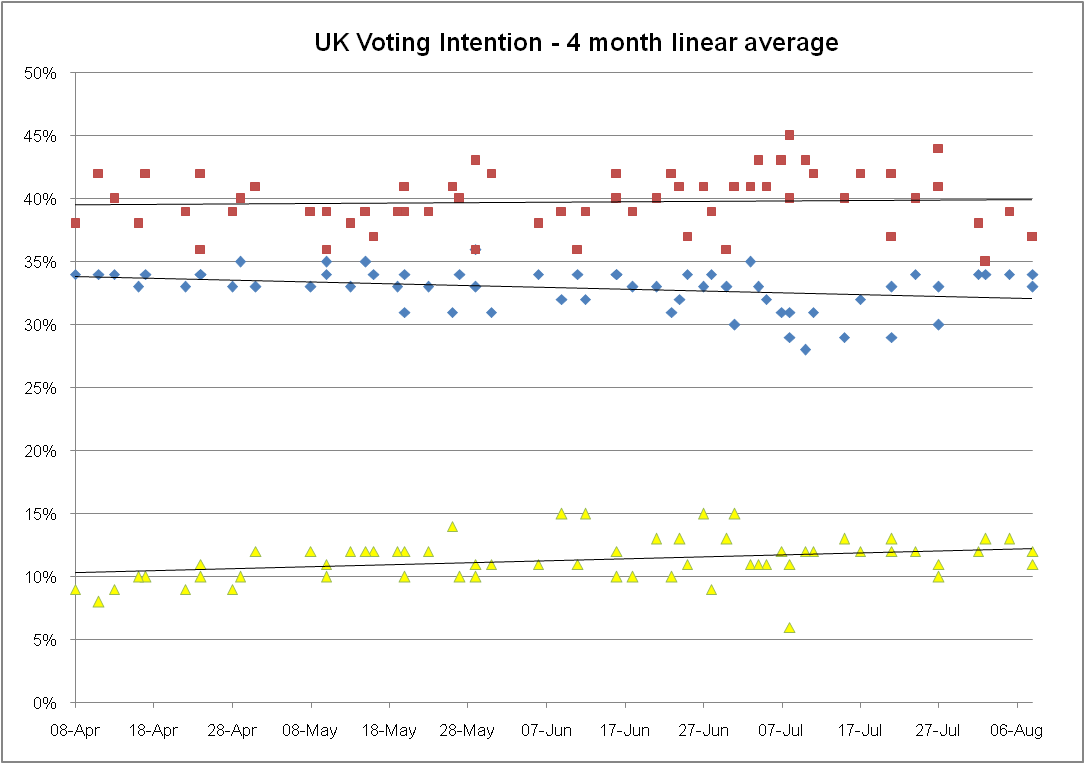Despite claims of a vacuum at the heart of British politics, with the election of a new Conservative leader still some four weeks away, the start of August has seen a surprise move in the opinion polls.
Where the Labour party went through July 2022 with an average lead in the polls of some 10.2%, six polls released so far at the start of August, now show Labour’s lead to have reduced to an average of just 3.7%.
| Date | Labour | Cons | Lib Dems | Pollster |
| 08-Aug | 37% | 33% | 11% | YouGov |
| 07-Aug | 37% | 34% | 12% | Opinion Research |
| 07-Aug | 40% | 35% | 12% | Redfield and Winton |
| 05-Aug | 39% | 34% | 13% | Techne |
| 02-Aug | 35% | 34% | 13% | YouGov |
| 01-Aug | 38% | 34% | 12% | Redfield and Winton |
| Average | 37.7% | 34.0% | 12.2% |
Trend support for the Conservatives which was hovering around 31% in mid July appears to have recovered to around the 34% level, with Labour support over the same period, dropping from 42% to just under 38%. The Liberal Democrats remain at around 12%.
It is not immediately clear what is driving the sudden change in the polls, and whether it will be sustained.


It may be that the Conservative party is benefiting from the extra media attention that their two leadership candidates are currently securing on the TV and radio.
Alternatively it might now be that the public has finally moved on from Boris Johnson. Where the polls didn’t show any movement immediately move after his resignation, the prime minister has been far more absent from the public eye in the last two weeks.
With Liz Truss now firmly considered the front runner to become Britain’s next prime minister, it is also possible that her apparent poll lead with Conservative party members, is impacting upon sentiment in the country at large.
A poll this week for Redfield and Winton found Liz Truss to be outperforming the Labour leader, Sir Keir Starmer. When asked who voters thought would be the better prime minister, 38% plumped for Ms Truss compared to 35% for Sir Keir.
This recent change in trajectory will be worrying for Labour. The current backdrop of political uncertainty in the Conservative party, warnings about an impending recession, and pressures on the cost of living, would typically constitute a landscape that should be supportive for the Official Opposition.
Although the latest analysis by politics.co.uk shows that Labour would emerge from any general election held today as the largest force at Westminster, the party would still be 38 seats short of an outright majority.
Where the possibility of a Labour-Lib Dem coalition looked briefly possible in July, the current electoral arithmetic now shows that the Scottish National Party would have a firm grip on the balance of power at Westminster.

